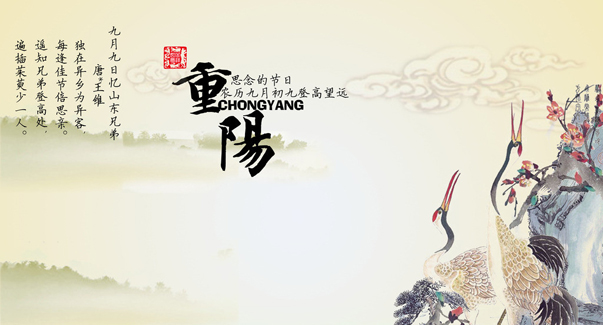
Introduction of Double Ninth Festival
重阳节概述
The Double Ninth Festival began to be observed in the Warring States Period. In the Han Dynasty,it was called Zhuyu Festival,or Chrysanthemum Festival as there was a custom of drinking chrysanthemum wine,eating colored cakes,and hanging an herb called zhuyu (comus officinalis) on the door. The festival comes when the day is clear with sunny skies and crisp air—a favorable time for climbing mountains. So climbing is a popular activity to mark the day in many places. The custom of hanging zhuyu on the door and climbing mountains started in the Han Dynasty,which was endowed then with the significance of eliminating diseases and subjugating disasters. In the Tang Dynasty, the custom of climbing and appreciatingchrysanthemum became so widely spread as to be taken as the main activity on this occasion,and to these,there added other activities,such as going to the mountain fair,offering sacrifices at the ancestral graves,hunting outsides, worshipping the God of fortune, bounding girls' feet. Nowadays, the Double Ninth Festival day is fixed as the Elderly Day,on which activities are held to show respect and love to the elderly people.
重阳节始于战国时期。在汉代,它被称为茱萸节,或菊花节,因为在那天喝菊花酒,吃彩色蛋糕,有在门上挂茱萸(山茱萸)草药的习俗。这个节日来的时候,天很清晰,晴朗的天空和清新的空气,适合爬山。所以,在这一天,许多地方都会有登山的流行活动。茱萸挂在门上和爬山的习俗始于汉代,它被赋予消除疾病和征服灾害的意义。在唐代,登山和欣赏菊花的风俗变得如此广泛的传播,以被视为在这个场合的主要活动,除了这些,还添加了其他活动,比如去山上游览,在祖先祭祀坟墓,外出狩猎,拜财神,裹女孩的脚。如今,重阳节固定为老人节,在那天活动举行,以示尊重和爱戴老人。












